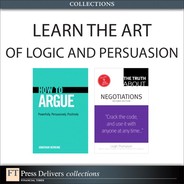Chapter 19. How to be a good winner
“OK, you’re absolutely right. I now see how wrong I was.” For some arguers, to hear their opponent say this is the holy grail. They might feel the aim of an argument should be total defeat of the opponent and a grovelling acceptance of their brilliance. But that is rarely realistic or desirable. We talked about how to lose gracefully but positively in Golden Rule 10. It’s also important to know how to be a good winner.
Remember Golden Rule 10: the relationship normally matters more than the argument. You can win the argument but lose the war. If the person you’re arguing with is left feeling humiliated or embarrassed it’s unlikely they will be keen to see you again or do business with you again. Requiring abject apologies is rarely, if ever, appropriate.
Give a way out
If it becomes clear you’re winning the argument, it may be best to give the person you’re talking to a way out. Don’t force them into conceding your point:
Seek agreement
Try to close an argument by referring to the agreement you have reached. The reality may be that they have come around to your point of view, or have come to accept your terms, but talking of agreement binds you both together. They are likely to feel warmer toward the argument if it’s seen as the result of a mutual process.
Involve the loser
If there has been a disagreement within a family or in a business context, try to involve the “losers” in a positive way.
Lording it over the loser will get you nowhere
The temptation, having won an argument, is to lord it over the other person. But that will get you nowhere. Boasting about how clever you are and how foolish they are might feel good at the time, but you will soon be very lonely!
“I just knew I was right and you were wrong!”
“I’m so glad we get to do it my way; it’s much better.”
Winning a one-sided victory may not be best
It’s possible in some situations to argue too well. Especially in the business context, it may not be wise to end up with an agreement that is entirely in your favor. If the deal leaves the other side in a bad position they are unlikely to want to do business with you again. Or, in a personal context, if you discuss with your partner how to divide up the housework and at the end it’s agreed that they’ll do everything and you nothing, you’ll live to regret that. The deal at the end of an argument needs to be reasonable for both sides. It needs to offer both parties something of benefit.
In conclusion, winning an argument needs to be done gracefully. I’ve given you the tools to win, now it’s up to you to go about it in a decent and noble manner. But remember to keep all arguments in context. Pick and choose those that are worthwhile, walk away from others. Balance winning an argument against losing a relationship. Enjoy healthy arguments, but avoid destructive ones. Keep a sense of humor. Use arguments positively. They are a great tool when used properly.
Summary
Win well. Be generous in victory and try to move on with the person you’re arguing with. Emphasize the positives for the other person from the discussion. If you win an argument make sure the other person does not leave the discussion bitter, unhappy or humiliated.
In practice
If you win an argument be quick to encourage and build up the other person. Avoid any boasting about your victory. Invite the other person to join you on a project.
